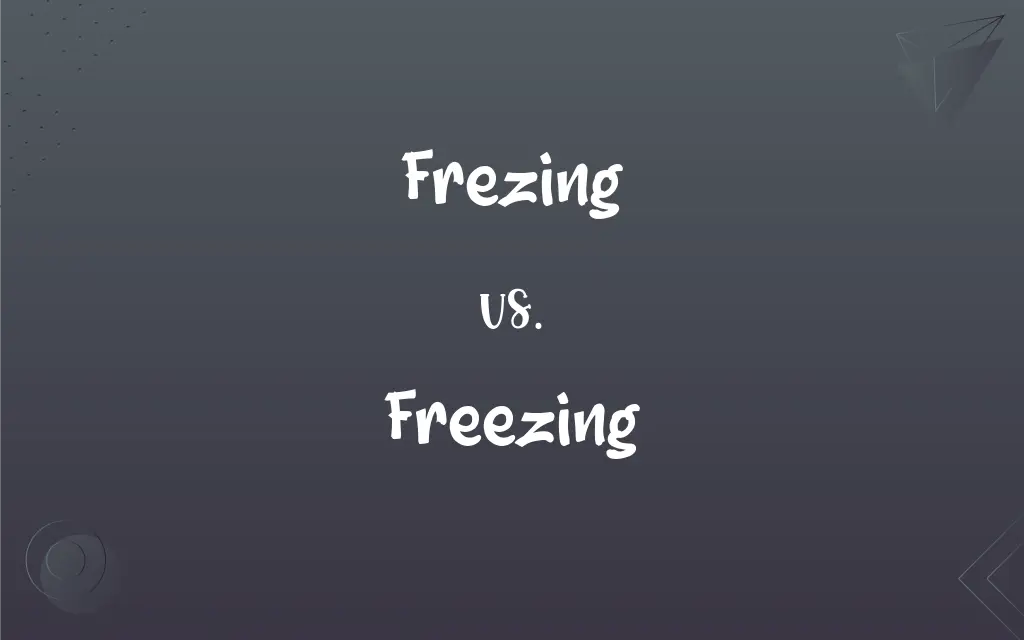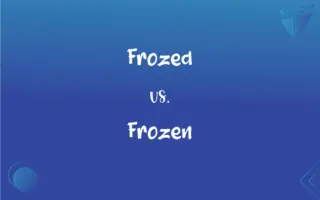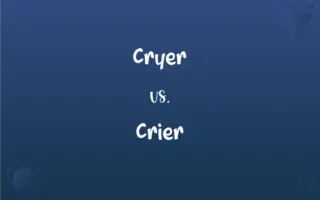Frezing vs. Freezing: Mastering the Correct Spelling
Edited by Janet White || By Harlon Moss || Published on March 22, 2024
"Frezing" is an incorrect spelling; the correct spelling is "freezing," which refers to the process of becoming frozen or extremely cold.

Which is correct: Frezing or Freezing
How to spell Freezing?

Frezing is Incorrect

Freezing is Correct
ADVERTISEMENT
Key Differences
Associate the extra "e" in "freezing" with "extreme," as in extremely cold temperatures.
Remember, "freezing" shares the double "e" with "freeze," its root word.
"Freezing" has double "e" to emphasize the extreme cold, like "eeek!" when you're cold.
Create a mnemonic: "Feel Really Extreme, Extra Zeal In Nippy Gusts," focusing on the "ee" in "freezing" for emphasis on cold.
Think of "freezing" as needing an extra "e" for the extra cold it represents.
ADVERTISEMENT
Correct usage of Freezing
The water turned to ice because it was frezing.
The water turned to ice because it was freezing.
I need to wear more layers when it's frezing.
I need to wear more layers when it's freezing.
The forecast says it will be frezing tonight.
The forecast says it will be freezing tonight.
Make sure to bundle up; it's frezing out there.
Make sure to bundle up; it's freezing out there.
It was so frezing outside that I couldn't feel my fingers.
It was so freezing outside that I couldn't feel my fingers.
Freezing Definitions
Freezing refers to the physical process where a liquid turns into a solid due to cold temperatures.
Water starts freezing at 0 degrees Celsius.
Freezing describes extremely cold weather or temperatures that feel very cold.
The freezing wind made it difficult to stay outside.
Freezing is used to describe a feeling of being very cold, often uncomfortably so.
I was freezing after forgetting my coat.
Freezing can also signify the action of preserving food by subjecting it to very low temperatures.
Freezing meat extends its shelf life.
As an adjective, freezing characterizes something that is at or below the freezing point of water.
The freezing lake was covered with a thick layer of ice.
To pass from the liquid to the solid state by loss of heat.
To acquire a surface or coat of ice from cold
The lake froze over in January. Bridges freeze before the adjacent roads.
To become clogged or jammed because of the formation of ice
The pipes froze in the basement.
Freezing Sentences
The freezing temperature made it difficult to stay outdoors.
They issued a freezing rain advisory for the area.
Keep the perishables in a freezing environment to preserve them.
The freezing point of water is a critical physical property.
The freezing wind chilled me to the bone.
The lake is completely freezing over in the winter.
Water starts freezing at 0 degrees Celsius.
Frostbite can occur in freezing weather conditions.
The forecast warns of freezing nights ahead.
The freezing air made my breath visible.
Freezing fog can make driving conditions hazardous.
A freezing bath can help reduce inflammation after intense exercise.
The freezing cold did not deter the determined hikers.
Freezing temperatures can cause pipes to burst.
Animals have different ways of surviving freezing climates.
Technology can help predict freezing weather patterns.
Preparing for freezing winters is crucial in some regions.
Adjusting to freezing climates can be challenging for newcomers.
Freezing rain creates a layer of ice on roads and sidewalks.
She experienced freezing sensations due to the sudden drop in temperature.
Freezing weather can impact the battery life of your car.
Plants need protection from freezing temperatures to survive.
Freezing conditions are expected to continue through the week.
The beauty of the landscape is enhanced by the freezing snow.
Freezing moments in sports are captured using high-speed photography.
Freezing Idioms & Phrases
Freezing cold
Extremely cold.
The morning was freezing cold, prompting everyone to wear their warmest clothes.
Freezing over
When a body of water becomes solid ice due to cold temperatures.
The pond is freezing over, so it's time to get the ice skates out.
Freezing rain
Rain that freezes upon contact with cold surfaces, forming ice.
Freezing rain caused the roads to become slippery and dangerous.
Freezing temperatures
Temperatures below the freezing point of water, 0 degrees Celsius or 32 degrees Fahrenheit.
The forecast predicts freezing temperatures for the entire week.
Freezing point
The temperature at which a liquid turns into a solid.
Scientists study the freezing point of various substances for different applications.
Break the freezing point
To reach a temperature where liquid water begins to freeze.
Overnight, the temperature is expected to break the freezing point.
Bitterly freezing
Describing an intense level of coldness that feels sharp and severe.
The wind is bitterly freezing today, making it painful to be outside.
Thaw after freezing
The process of something becoming liquid again after being frozen.
The thaw after freezing creates slippery conditions as ice melts to water.
Freezing up
Becoming immobilized or unable to function in the cold.
My car's engine is freezing up in this cold weather; it won't start.
Freezing fog
A type of fog where tiny water droplets in the air freeze upon contact with objects, forming rime ice.
Driving through freezing fog this morning was like moving through a frosty fairyland.
Freezing blast
A sudden and intense flow of cold air.
A freezing blast of air hit me as I stepped outside, reminding me winter was far from over.
Antifreeze for freezing temperatures
A substance added to water to lower its freezing point, used in car engines.
Before winter arrives, it's important to check that your car has enough antifreeze for freezing temperatures.
Brace for freezing weather
To prepare for the onset of cold weather conditions.
The city is bracing for freezing weather, with emergency shelters opening for those in need.
Surviving the freezing cold
Managing to stay safe and healthy in extremely cold weather.
Wearing layers is essential for surviving the freezing cold.
Freezing effect
The impact that freezing temperatures have on the environment, objects, or individuals.
The freezing effect on the crops was devastating, ruining much of the harvest.
Freezing night
A night with temperatures below the freezing point.
It was a freezing night, so we gathered around the fireplace to stay warm.
Freezing survival strategies
Techniques or methods used to endure extremely cold temperatures.
Animals employ various freezing survival strategies, such as hibernation or growing thicker fur.
Freezing conditions
Weather that is characterized by temperatures below freezing.
The hikers were not prepared for the freezing conditions they encountered.
Freezing chill
A cold feeling that seems to penetrate through clothing and skin.
A freezing chill went through the crowd as the sun set and temperatures dropped.
FAQs
Why is it called freezing?
It's called freezing because it describes the process of something becoming solid (frozen) due to cold temperatures.
What is the pronunciation of freezing?
Freezing is pronounced as /ˈfriː.zɪŋ/.
What is the verb form of freezing?
The verb form is "freeze," with "freezing" being the present participle.
What is the plural form of freezing?
Freezing is used the same way for both singular and plural contexts.
Which vowel is used before freezing?
The vowel "e" is used before "zing" in freezing.
Which preposition is used with freezing?
"At" is commonly used with freezing, as in "at freezing temperatures."
Is freezing a noun or adjective?
Freezing is an adjective and also functions as a noun in contexts like "the freezing of water."
What is the root word of freezing?
The root word is "freeze."
Is the freezing term a metaphor?
Freezing can be used metaphorically to describe extremely cold feelings or relations.
Which conjunction is used with freezing?
"And" is often used to connect freezing with other conditions, e.g., "freezing and snowing."
Which article is used with freezing?
Both "the" and "a" can be used, depending on the context.
Is freezing an abstract noun?
No, freezing is a concrete process or state, not abstract.
What is a stressed syllable in freezing?
The first syllable "freez-" is the stressed syllable in freezing.
What part of speech is freezing?
Freezing is an adjective and also acts as a noun in certain contexts.
What is the opposite of freezing?
The opposite of freezing is "thawing" or "melting."
Which determiner is used with freezing?
Determiners like "the," "a," and "this" can be used with freezing.
What is the first form of freezing?
The first form is "freeze" (base form).
What is the singular form of freezing?
Freezing is both singular and plural; it does not change.
Is freezing an adverb?
No, freezing is not an adverb.
Is freezing a negative or positive word?
Freezing is often perceived negatively due to the discomfort associated with cold.
Is freezing a vowel or consonant?
The word freezing contains both vowels (e, i) and consonants (f, r, z, n, g).
Is freezing a countable noun?
As a process or state, freezing is not typically considered countable.
Is freezing a collective noun?
No, freezing is not a collective noun.
Is the word freezing imperative?
Freezing can be part of an imperative statement in instructions, but the word itself is not imperative.
How many syllables are in freezing?
There are two syllables in freezing.
How is freezing used in a sentence?
"The pond is freezing over due to the cold snap."
How do we divide freezing into syllables?
Freezing is divided into syllables as "freez-ing."
What is another term for freezing?
Another term for freezing is "frosting."
What is the second form of freezing?
The second form is "froze" (past tense).
What is the third form of freezing?
The third form is "frozen" (past participle).
About Author
Written by
Harlon MossHarlon is a seasoned quality moderator and accomplished content writer for Difference Wiki. An alumnus of the prestigious University of California, he earned his degree in Computer Science. Leveraging his academic background, Harlon brings a meticulous and informed perspective to his work, ensuring content accuracy and excellence.
Edited by
Janet WhiteJanet White has been an esteemed writer and blogger for Difference Wiki. Holding a Master's degree in Science and Medical Journalism from the prestigious Boston University, she has consistently demonstrated her expertise and passion for her field. When she's not immersed in her work, Janet relishes her time exercising, delving into a good book, and cherishing moments with friends and family.


































































